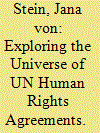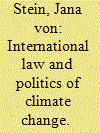| Srl | Item |
| 1 |
ID:
159253


|
|
|
|
|
| Summary/Abstract |
The international human rights (HR) regime is vast and complex. Yet, most of what we know about it draws from a handful of agreements, often chosen for their prominence and/or perceived centrality to the HR project. This article argues that HR research needs to expand its scope to encompass all agreements in this realm, and presents a new data resource that enables scholars to accomplish that goal. Using the data, I demonstrate that the literature has painted an unrepresentative portrait of HR agreements. In addition to making comprehensive analysis possible, the database moves the literature forward by (1) taking into account important legal distinctions in the process of making treaties binding, (2) providing information on treaty design, and (3) considering relationships between agreements. I present several applications and discuss future areas of inquiry. Network analysis and the linking of treaty participation to HR outcomes are two notable areas of interest.
|
|
|
|
|
|
|
|
|
|
|
|
|
|
|
|
| 2 |
ID:
080978


|
|
|
|
|
| Publication |
2008.
|
| Summary/Abstract |
A considerable challenge for the creators of international environmental agreements is how to design mechanisms that deter defection without deterring participation. Relatively ``soft'' law often garners widespread participation, but it creates few concrete incentives for states to improve behavior. ``Harder'' commitments make shirking more difficult, but these institutional features may deter from joining the very states whose practices are least consistent with the treaty's requirements. Empirical analyses of ratification of the core agreements of the climate change regime support these propositions. Flexibility provisions provide one mechanism for states to mitigate this dilemma. The findings with regard to one flexibility mechanism strongly support this argument. The results with regard to a second flexibility mechanism, however, tend to follow an opposite pattern. The author offers a preliminary interpretation of this finding. Finally, this article provides insight into how international social networks and the strength of domestic nongovernmental organizations affect ratification
|
|
|
|
|
|
|
|
|
|
|
|
|
|
|
|
| 3 |
ID:
080975


|
|
|
|
|
| Publication |
2008.
|
| Summary/Abstract |
This special issue seeks to move forward the development of an empirical research agenda that takes seriously the complexity of how international organizations (IOs) function and the need to study that complexity at all levels of analysis by using robust research tools. We advocate for a broad empirical research approach that molds and sharpens theories about IOs by conducting systematic tests in large-sample environments. Two themes create a common thread throughout this issue. First, shifting the focus from whether IOs matter to how they work requires acknowledgment of the contingency of cause and effect. A second common thread lies in the authors' treatment of IO membership as an aggregate phenomenon-that is, as a set of institutions and relationships evolving over time and with many members rather than as a single organization.
|
|
|
|
|
|
|
|
|
|
|
|
|
|
|
|
| 4 |
ID:
103120


|
|
|
|
|
| Publication |
2009.
|
| Summary/Abstract |
This article seeks to engage scholars in a richer understanding of post-civil war settlement implementation. It examines why some parties execute the provisions of these agreements fairly extensively, whereas others abide by few, if any, dimensions. We explore four peace settlements, developing a new measure that gauges various aspects of implementation. We examine how two factors in particular affect the degree to which parties abide by their commitments. First, we find that implementation is more likely as international support increases. This occurs through three chief mechanisms: mitigating commitment problems, generating audience costs, and the contingency of aid on implementation. Second, the balance of capabilities is a significant domestic influence on implementation. Parties are most prone to abide when the government is militarily superior, but the former rebels are powerful enough to meaningfully check government action. Implementation is less successful when government capabilities far exceed those of the rebels or when the rebels are particularly strong.
|
|
|
|
|
|
|
|
|
|
|
|
|
|
|
|